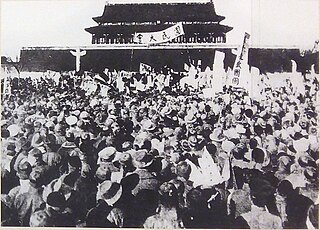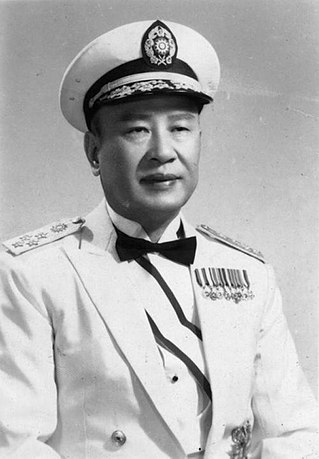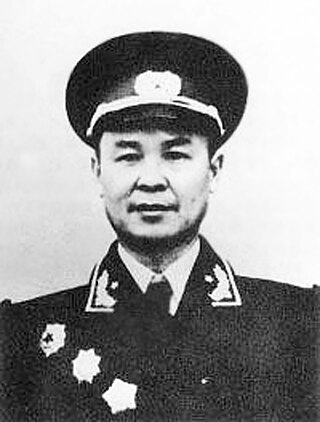Related Research Articles

The Second Sino-Japanese War, also known in Japan as the Second China–Japan War, and in China as the Chinese War of Resistance against Japanese Aggression, was fought between the Republic of China and the Empire of Japan from 1937 to 1945 as part of World War II. It is often regarded as the beginning of World War II in Asia, though some scholars consider the European War and Pacific War to be separate, albeit concurrent. It was the largest Asian war in the 20th century and has been described as "the Asian Holocaust", in reference to the scale of Japanese war crimes against Chinese civilians.

The May Fourth Movement was a Chinese cultural and anti-imperialist political movement which grew out of student protests in Beijing on May 4, 1919. Students gathered in front of Tiananmen to protest the Chinese government's weak response to the Treaty of Versailles decision to allow Japan to retain territories in Shandong that had been surrendered by Germany after the Siege of Tsingtao in 1914. The demonstrations sparked nation-wide protests and spurred an upsurge in Chinese nationalism, a shift towards political mobilization away from cultural activities, and a move towards a populist base, away from traditional intellectual and political elites.

The First Indochina War was fought between France and Việt Minh, and their respective allies, from 19 December 1946 until 20 July 1954. Việ

The New Army, more fully called the Newly Created Army, was the modernised army corps formed under the Qing dynasty in December 1895, following its defeat in the First Sino-Japanese War. It was envisioned as a regular and professional fully trained and equipped according to Western standards with a reserve. In 1903 an imperial edict expanded it to 36 divisions of 12,500 men each, or total of 450,000 in peacetime supplemented by a further 523,000 reservists in wartime though it never achieved a strength above 300,000.

Bai Chongxi was a Chinese general in the National Revolutionary Army of the Republic of China (ROC) and a prominent Chinese Nationalist leader. He was of Hui ethnicity and of the Muslim faith. From the mid-1920s to 1949, Bai and his close ally Li Zongren ruled Guangxi province as regional warlords with their own troops and considerable political autonomy. His relationship with Chiang Kai-shek was at various times antagonistic and cooperative. He and Li Zongren supported the anti-Chiang warlord alliance in the Central Plains War in 1930, then supported Chiang in the Second Sino-Japanese War and the Chinese Civil War. Bai was the first defense minister of the Republic of China from 1946 to 1948. After losing to the Communists in 1949, he fled to Taiwan, where he died in 1966.

The National Revolutionary Army, sometimes shortened to Revolutionary Army (革命軍) before 1928, and as National Army (國軍) after 1928, was the military arm of the Kuomintang from 1925 until 1947 in China. It also became the regular army of the Republican era during the KMT's period of party rule beginning in 1928. It was renamed the Republic of China Armed Forces after the 1947 Constitution, which instituted civilian control of the military.

The Soviet invasion of Manchuria, formally known as the Manchurian Strategic Offensive Operation or simply the Manchurian Operation, began on 9 August 1945 with the Soviet invasion of the Japanese puppet state of Manchukuo. It was the largest campaign of the 1945 Soviet–Japanese War, which resumed hostilities between the Union of Soviet Socialist Republics and the Empire of Japan after almost six years of peace. Since 1983, the operation has sometimes been called Operation August Storm after U.S. Army historian David Glantz used this title for a paper on the subject.

Women have been serving in the military since the inception of organized warfare, in both combat and non-combat roles. Their inclusion in combat missions has increased in recent decades, often serving as pilots, mechanics, and infantry officers.
The 1939–1940 Winter Offensive was one of the major engagements between the National Revolutionary Army and Imperial Japanese Army during the Second Sino-Japanese War, in which Chinese forces launched their first major counter-offensive on multiple fronts. Although this offensive failed to achieve its original objectives, some studies have shown that it came as a heavy blow to the Japanese forces, as well as a massive shock to the Japanese military command, which did not expect the Chinese forces to be able to launch an offensive operation on such a large scale.

Zhang Fakui was a Chinese Nationalist general who fought against northern warlords, the Imperial Japanese Army and Chinese Communist forces in his military career. He served as commander-in-chief of the 8th Army Group and commander-in-chief of NRA ground force before retiring in Hong Kong in 1949.
The Battle of Kunlun Pass was a series of conflicts between the Imperial Japanese Army and the Chinese forces surrounding Kunlun Pass, a key strategic position in Guangxi province. The Japanese forces planned to cut off Chinese supply lines linking to French Indochina, but the Chinese forces managed to fight off the attacks.
Feminism in China refers to the collection of historical movements and ideologies in time aimed at redefining the role and status. women in China. Feminism in China began in the 20th century in tandem with the Chinese Revolution. Feminism in modern China is closely linked with socialism and class issues. Some commentators believe that this close association is damaging to Chinese feminism and argue that the interests of the party are placed before those of women.

Huang Xianfan was a Zhuang Chinese historian, ethnologist and educator.

Wei Guoqing was a Chinese government official, military officer and political commissar of Zhuang ethnicity. He served as the Chairman of Guangxi from 1958 to 1975 and on the Chinese Communist Party's Politburo (1973–1982) and as Director of the People's Liberation Army's General Political Department (1977–1982). Wei was one of the few members of the 9th, 10th, 11th and 12th Central Committees (1969–1987) and the 10th through 12th politburos not purged during the Great Proletarian Cultural Revolution (GPCR) or Deng Xiaoping's backlash. He was also a Vice Chair of the National People's Congress Standing Committee (1975–1989) and of the Chinese People's Political Consultative Conference (1964–1983).

The Battle of Taierzhuang took place during the Second Sino-Japanese War in 1938. It was fought between the armies of the Republic of China and the Empire of Japan. The battle was that war's first major Chinese victory. It humiliated the Japanese military and its reputation as an invincible force; for the Chinese, it represented a tremendous morale boost.

Women took on many different roles during World War II, including as combatants and workers on the home front. “More than six million women took wartime jobs in factories, three million volunteered with the Red Cross, and over 200,000 served in the military.” The war involved global conflict on an unprecedented scale; the absolute urgency of mobilizing the entire population made the expansion of the role of women inevitable, although the particular roles varied from country to country. Millions of women of various ages were injured or died as a result of the war. “When the war ended, a majority of women wanted to keep their jobs and their new-found economic and social independence, but nearly all were laid off, as orders for war materials decreased and millions of men returned home from military service seeking jobs.” Because the war took such a toll on the nation, many women were left trying to work even when the men returned home.

Guangxi, officially the Guangxi Zhuang Autonomous Region, is an autonomous region of the People's Republic of China, located in South China and bordering Vietnam and the Gulf of Tonkin. Formerly a province, Guangxi became an autonomous region in 1958. Its current capital is Nanning.
Elisabeth Joan "Lisa" Croll, was a New Zealand anthropologist. She is known as the first anthropologist to visit Chinese villages in a period when political actions made access into the country for foreigners difficult. Croll published books on the subject and held several short-term fellowships at various educational institutions. She also worked for United Nations agencies and international non-government organisations.
The Second Sino-Japanese War was fought between 1937 and 1945, involving the military forces of the China and Japan.

Zhou Meiyu (1910–2001) was a Chinese nurse, known as "the mother of military nursing in China" and "among the most influential Chinese nurses of the early twentieth century". She was the founder of the Army School of Nursing at the Emergency Medical Service Training School in Guiyang, a strong proponent of military nursing during and after the Second Sino-Japanese War and Chinese Civil War, and the first woman in the Republic of China to attain the rank of major general. Xu Nanli, an adjunct professor at National Yang-Ming University who studied under her, described her as the "nightingale" of China.
References
- 1 2 3 Zhu, Pingchao (2015-10-30). Wartime Culture in Guilin, 1938–1944: A City at War. Lexington Books. ISBN 978-0-7391-9684-7.
- 1 2 Chung, Mary Keng Mun (2005). Chinese Women in Christian Ministry: An Intercultural Study. Peter Lang. ISBN 978-0-8204-5198-5.
- ↑ Women of China. Foreign Language Press. 2001.
- ↑ Honig, Emily (1992-03-01). Sisters and Strangers: Women in the Shanghai Cotton Mills, 1919-1949. Stanford University Press. ISBN 978-0-8047-2012-0.
- ↑ Siu, Bobby (1982). Women of China: Imperialism and Women's Resistance, 1900-1949. Zed Press. ISBN 978-0-905762-58-6.
- ↑ The Chalice and the Blade in Chinese Culture: Gender Relations and Social Models. China Social Sciences Publishing House. 1995. ISBN 978-7-5004-1741-5.
- 1 2 Croll, Elisabeth (2011). Feminism and socialism in China. Abingdon, Oxon: Routledge. ISBN 978-1-136-33732-1. OCLC 828737579.
- 1 2 Yihong, Pan (1997). "Feminism and Nationalism in China's War of Resistance against Japan". The International History Review. 19 (1): 115–130. doi:10.1080/07075332.1997.9640778. ISSN 0707-5332. JSTOR 40108087.
- ↑ Morgan, Robin (2016-03-08). Sisterhood Is Global: The International Women's Movement Anthology. Open Road Media. ISBN 978-1-5040-3324-4.